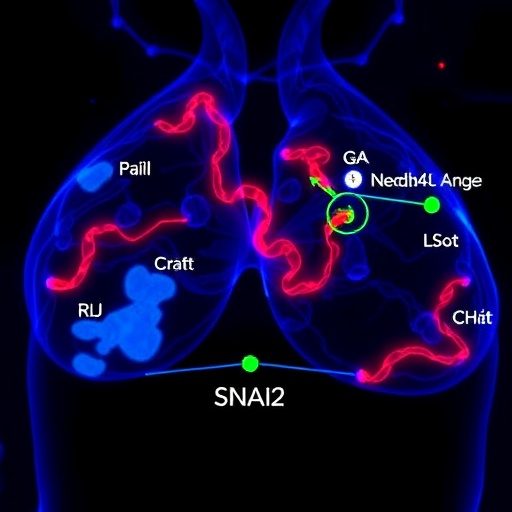Recent advances in breast cancer research have shifted focus towards intricate molecular pathways that influence tumor behavior. The complexity of cancer biology necessitates a multi-faceted approach to understanding how specific regulatory proteins can either promote or restrain cancer progression. In a recent study conducted by Zuo, B., Li, X., Wang, M., and their colleagues, a pivotal role was identified for the SP1/NEDD4L axis in regulating the expression of SNAI2, a known contributor to epithelial-mesenchymal transition (EMT) in breast cancer cells. This research not only sheds light on the molecular underpinnings of breast cancer metastasis but also opens new avenues for targeted therapy.
At the heart of this study lies the transcription factor SP1, which is instrumental in the regulation of various genes associated with cell growth and differentiation. Elevated levels of SP1 have been frequently associated with malignancies, prompting researchers to delve deeper into its role within the context of breast cancer. The authors of this research articulated how SP1 acts as a crucial regulator of NEDD4L, an E3 ubiquitin ligase that subsequently influences the stability and expression of SNAI2. By mapping this regulatory pathway, the authors have unraveled a crucial mechanism that underpins breast cancer progression.
One of the key findings of the research illustrates how the interaction between SP1 and NEDD4L plays a significant role in modulating the levels of SNAI2. High levels of SNAI2 have been correlated with enhanced invasive properties of breast cancer cells, contributing to poorer patient outcomes. The study performed a series of in vitro assays involving breast cancer cell lines to elucidate the functional impact of this regulatory axis. The data revealed that manipulating SP1 levels directly affected NEDD4L and subsequently SNAI2, indicating that therapeutic strategies aimed at enhancing NEDD4L expression or inhibiting SNAI2 may provide new routes for treatment regimens.
Moreover, this research incorporates a robust set of experiments examining the effects of SP1 knockdown on SNAI2 expression. The results demonstrated that reduced SP1 levels resulted in diminished SNAI2 expression, effectively reversing the invasive characteristics typically associated with high SNAI2 levels. This finding is particularly significant as it underscores the potential for targeting the SP1/NEDD4L axis as an innovative approach to mitigate breast cancer invasion and metastasis.
Furthermore, the authors investigated the clinical relevance of their findings by analyzing tissue samples from breast cancer patients. They identified a marked correlation between high SP1 expression and poor overall survival rates. This clinical dataset adds a layer of validation to their mechanistic studies, demonstrating that the SP1/NEDD4L/SNAI2 pathway is not merely an in vitro phenomenon but has tangible implications in the clinical setting.
In addition to the insights provided into the SP1/NEDD4L axis, this research emphasizes the importance of understanding EMT in the context of cancer. SNAI2, as a key player in the EMT process, facilitates the transition of epithelial cells into a mesenchymal phenotype, a change that is often accompanied by increased migratory and invasive capabilities. The ability of tumor cells to undergo EMT has been widely documented as a critical feature of metastasis, thereby underscoring the relevance of regulating SNAI2 expression as a means of controlling breast cancer spread.
The involvement of NEDD4L as a negative regulator of SNAI2 presents a fascinating angle for potential therapeutic intervention. As an E3 ubiquitin ligase, NEDD4L plays a pivotal role in marking proteins for degradation, thereby controlling cellular homeostasis. The findings suggest that enhancing NEDD4L activity could serve as a novel strategy to decrease SNAI2 levels and hinder cancer progression. This could represent a critical breakthrough in developing targeted therapies that are both effective and less toxic compared to conventional chemotherapy options.
Moreover, the study lays the groundwork for future investigations focused on the therapeutic modulation of the SP1/NEDD4L axis. The prospect of utilizing small molecules or biologics to restore or enhance NEDD4L function offers a tantalizing opportunity for clinicians. Such strategies could lead to a reduction in SNAI2-driven pathways that promote metastasis, thereby improving prognoses for breast cancer patients.
Beyond the immediate implications of this research, it prompts a broader inquiry into the regulatory mechanisms governing breast cancer biology. Understanding the interplay between transcription factors, E3 ligases, and signaling pathways is integral to devising more sophisticated treatment approaches. This study exemplifies how dissecting cancer pathways at a molecular level can yield actionable insights that pave the way for groundbreaking therapeutic advancements.
As the scientific community continues to unravel the complexities of cancer biology, it becomes increasingly evident that a concerted effort towards understanding the molecular orchestration of tumor behavior is paramount. The work by Zuo et al. stands as a prime example of this endeavor, providing critical insights into the SP1/NEDD4L/SNAI2 axis in breast cancer, with the potential to inspire subsequent research and innovative treatment strategies.
In conclusion, this groundbreaking study elucidates the intricate molecular networks that govern breast cancer progression, highlighting the SP1/NEDD4L axis as a critical regulatory pathway. The findings not only enhance our understanding of tumor biology but also propose exciting avenues for future therapeutic interventions aimed at improving patient outcomes in breast cancer treatment. Experts in the field are encouraged to consider the implications of this research as they continue to navigate the complex landscape of cancer therapy and aim for more efficacious treatment modalities.
Subject of Research: Breast Cancer Progression and Molecular Regulation
Article Title: The SP1/NEDD4L Axis Suppresses the Breast Cancer Progression by Downregulating SNAI2 Expression.
Article References:
Zuo, B., Li, X., Wang, M. et al. The SP1/NEDD4L Axis Suppresses the Breast Cancer Progression by Downregulating SNAI2 Expression.
Biochem Genet (2025). https://doi.org/10.1007/s10528-025-11301-1
Image Credits: AI Generated
DOI: https://doi.org/10.1007/s10528-025-11301-1
Keywords: Breast cancer, SP1, NEDD4L, SNAI2, epithelial-mesenchymal transition, metastasis, therapeutic intervention.




